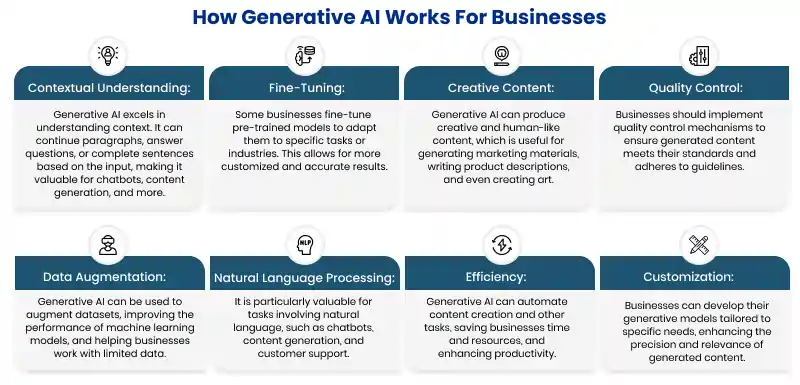
In today's rapidly evolving technological landscape, artificial intelligence (AI) continues to be a driving force behind transformative innovations. One of the most exciting developments in the world of AI is Generative AI, a cutting-edge technology that promises to revolutionize the way we interact with machines, create content, and solve complex problems. As we stand on the brink of a new era in AI, it's crucial to understand Generative AI meaning, how Generative AI works, it it a game changer for businesses, and the immense potential it holds for various industries. Also, explore how a professional digital marketing company can utilize the power of both human minds and AI to deliver optimal results.
Generative AI is an emerging class of AI models and algorithms that have garnered attention for their ability to generate, create, and mimic human-like content, be it text, images, music, or even entire virtual worlds. Unlike traditional AI systems that rely on predefined rules and data patterns, Generative AI can generate entirely new and original content based on the patterns it has learned during its training. This capacity for creativity has sparked immense excitement and curiosity among researchers, businesses, and technologists worldwide.

From healthcare to entertainment, from finance to manufacturing, Generative AI is making its presence felt in a myriad of industries. In the coming sections, we'll explore how this innovative AI tool is poised to reshape the landscape across various sectors, enabling new possibilities, increasing efficiency, and driving progress like never before.
Generative AI, with its ability to create and generate content, offers innovative solutions to a myriad of challenges that businesses face in today's rapidly evolving landscape. Here, we'll delve into these challenges in detail, exploring how generative artificial intelligence can be harnessed to drive positive outcomes for businesses across various sectors. Generative AI offers numerous ways to benefit businesses by automating tasks and enhancing productivity. Here's how generative AI works for businesses:

Generating and maintaining fresh, engaging, and relevant content is an ongoing challenge for businesses, especially in the digital age. Generative AI can provide a solution by automating content creation. It can craft marketing materials, including ad copy, product descriptions, and email campaigns, saving businesses time and resources while ensuring a continuous stream of captivating content. Furthermore, generative AI enhances personalization by refining recommendation systems. E-commerce and content platforms benefit from more accurate product or content suggestions, ultimately increasing customer engagement and conversion rates.
In industries like fashion, architecture, and industrial design, the initial stages of conceptualization and prototyping can be resource-intensive. Generative AI can assist by providing design concepts and even 3D models, reducing the time and effort required for product development. This innovation streamlines the creative process, enabling businesses to bring products to market more efficiently.
Data is the lifeblood of many businesses, particularly those reliant on machine learning models. However, obtaining and curating large and diverse datasets can be challenging. Generative AI comes to the rescue by creating synthetic data, helping augment machine learning datasets. This is invaluable when real data is limited, costly to acquire, or when privacy concerns prohibit the sharing of sensitive information.
Businesses aspiring to expand globally face the challenge of translating and localizing their content for diverse audiences. Generative artificial intelligence facilitates this process by offering automated translation and localization services. This not only broadens a business's reach but also ensures that content resonates with local customers, fostering a deeper connection and understanding.
In the creative realm, including art, music, and video game development, generative AI has become a valuable tool. It enables artists and content creators to produce new works more efficiently and explore unique styles. Game developers, for instance, can utilize AI to generate in-game assets, characters, and even entire virtual worlds, enhancing the immersive quality of their products.
In the age of social media and online platforms, businesses face the challenge of monitoring and controlling inappropriate or harmful content. Generative AI can be employed to automatically identify and filter out such content, thereby creating a safer and more welcoming online environment for users.
In the financial sector, predicting market trends accurately is a constant challenge. Generative AI can assist by analyzing vast amounts of financial data to forecast market trends, aiding in investment decisions and potentially enhancing returns on investments.
Generative AI has the ability to streamline the software development process. It can generate code snippets, aiding developers in writing complex algorithms, and even automating the creation of repetitive parts of code. This reduces development time and enhances coding efficiency. Moreover, it can generate test cases, leading to improved software quality and faster development cycles.
Natural language understanding and generation are at the core of Generative AI's capabilities. This is particularly valuable in IT solutions, where chatbots and virtual assistants can provide efficient customer support and technical assistance. Generative AI-powered chatbots can generate contextually relevant responses, making them indistinguishable from human agents in customer interactions. This not only reduces the burden on human support teams but also enhances the overall customer experience.
Data is the lifeblood of IT operations. Generative AI can create synthetic data to augment machine learning datasets, ensuring that models are well-trained and capable of making more accurate predictions. In data analysis, AI can assist in generating meaningful insights from large datasets, enabling businesses to make data-driven decisions.
Cybersecurity is a top concern for IT solutions, and Generative AI can play a significant role in threat detection. It can generate and analyze cybersecurity data, helping businesses identify potential threats and vulnerabilities in real-time. This is instrumental in safeguarding digital assets and protecting against evolving security risks.
Quality assurance is vital for IT solutions, and Generative AI can expedite this process. It can generate test cases and automate testing procedures, thereby reducing development time and costs, while also improving software quality and reliability.
Generative AI operates by learning and mimicking patterns in data to create entirely new content. During the training phase, the model is exposed to vast datasets of the content it's designed to generate, such as text, images, or music. It learns the intricate relationships, structures, and contextual information within this data, essentially grasping the essence of what makes the content unique.
For example, a text generator can produce coherent sentences or paragraphs, while an image generator can create visual content. Depending on the model's architecture and fine-tuning, it can also adapt its output to match specific criteria or styles. The model may even undergo a feedback loop where generated content is evaluated and used to refine the model further. This iterative process is how generative artificial intelligence learns to produce increasingly sophisticated and contextually relevant content.
Notable models like GANs and transformers have found applications in various domains, showcasing the immense potential of Generative AI. However, responsible use and ethical considerations are paramount, as they help address concerns related to biases, privacy, and misuse in content generation.
1. What is Generative AI definition, and how does it differ from other AI technologies?
Generative AI is a subset of artificial intelligence that focuses on creating new content, such as text, images, or music, based on patterns it learns from existing data. It differs from other AI technologies, like machine learning, which primarily analyze and process data rather than generate new content.
2. What are the applications of Generative AI in business and technology?
Generative AI has numerous applications, including content generation, code creation, natural language processing, and image synthesis. It can improve content marketing, automate software development, and enhance customer support through chatbots, among many other use cases.
3. Can Generative AI models be fine-tuned for specific tasks or industries?
Yes, generative artificial intelligence models can be fine-tuned to generate content that's more relevant and specific to particular tasks or industries. This process allows the models to produce content that aligns with a company's unique requirements.
4. Are there ethical concerns related to Generative AI, such as bias or misuse?
Yes, there are ethical concerns. Generative AI can generate biased or misleading content if the training data contains biases. Additionally, there's a risk of misuse, such as the creation of deepfake videos. Ensuring ethical and responsible use is essential to mitigate these concerns.
5. What is the future potential of Generative AI, and how can businesses harness it?
The future potential of Generative AI is vast. Businesses can leverage it to enhance creativity, streamline operations, and innovate across industries. To harness this potential, organizations should stay updated on the latest advancements, consider ethical implications, and invest in the necessary infrastructure and talent to effectively integrate Generative AI into their operations.
Generative AI represents a remarkable leap forward in the field of artificial intelligence. It's not merely about analyzing data but also about creating something new and imaginative. We've explored how Generative AI is revolutionizing content creation, streamlining IT solutions, and making businesses more innovative and efficient. From generating code to enhancing customer support and from data augmentation to content marketing, the potential applications are vast and diverse.
The journey into the world of Generative AI is still unfolding, with new innovations and applications on the horizon. Businesses that embrace this technology with ethical diligence will find themselves at the forefront of a transformative revolution, where the possibilities are limited only by our imagination and our commitment to responsible innovation. As Generative AI continues to evolve, it will undoubtedly redefine the landscape of IT solutions and business, reshaping the way we operate, create, and innovate in the years to come.
We offer a range of digital marketing solutions and services to take your business to the next level. Visit our website for more details and let’s team up to unleash a thriving future together.
Interested in our Digital marketing Services?

Leave a Reply